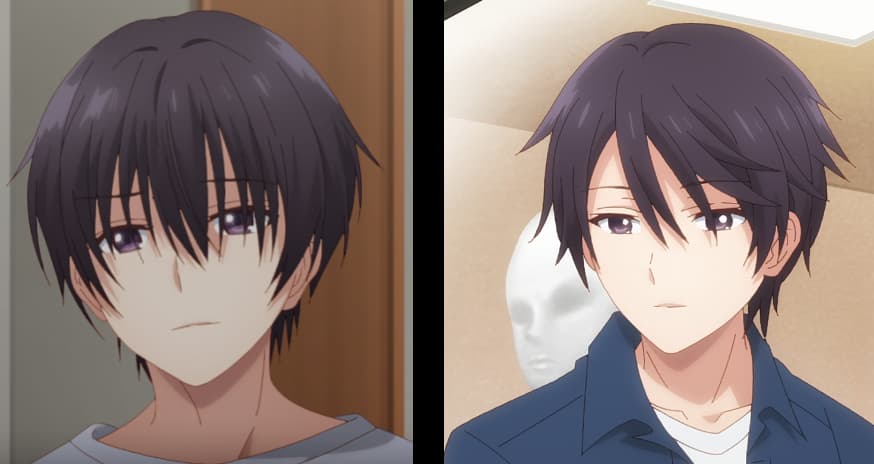“The Angel next Door Spoils me rotten” (お隣の天使にダメ人間にされていた件/“Otonari no Tenshi ni Dameningen ni sareteita Ken”, I'll shorten it to TonaTen) just got an anime adaption earlier this year. With a name like this, it seems to scream “I'm a fastfood romance” at you like no other. So how about we play a quick round of fast-food romance trope-bingo. Shall we?
(WARNING: this is where the spoilers start)

Oh wow, if that ain't a bingo!

Special thanks go out to “Protagonist or heroine lives alone” for the double-hit that turned this whole thing around.
Even from just the title, no one could blame you for thinking that this is indeed a fastfood romance. To my surprise though, it is not. Instead, it is a surprisingly nuanced, simple and pure romance story. There's no harem here, no ecchi, not much plot to be honest, and it's not a RomCom but really just a Rom…

Ahem, anyway, before I talk more about the anime, some quick background.
How I got Here
Almost a year ago, I started to read the TonaTen manga by pure chance as it began publishing in one of my free manga reader apps. The manga itself is an adaption, as the source is a light novel series. It didn't leave much of an impression on me to be honest, though I did continue reading it until I started watching the anime on a whim.
I was quite surprised when I found out that this got an anime adaption. Not for any particular reason, I'm just always surprised when I realize that something I know or even read is apparently popular enough to get an anime adaption. On the other hand, I'm still waiting for a Kaoru Hana wa Rin to Saku anime…
Anyway, while I didn't get too much out of the manga, I now attribute this mostly to its glacial pacing. The series itself, as a pure romance, is already a rather slow burn, and the fact that they slowed the manga adaption down to half a chapter every three weeks didn't help my enjoyment much… who would've thought that these manga reader apps make for a painful user experience?
So how was It?
Surprisingly, pretty good. After finishing the show, I initially gave it an 8 on MAL based on my enjoyment, though after thinking about it a bit more I lowered that to a 7 due to lack of depth.
The show presents us with our main couple Amane and Mahiru who just happen to be neighbors, as they become ever closer, going from rather distant neighbors to friends and finally lovers.
By chance, Mahiru (who lives alone, just like Amane) notices that Amane's apartment is an absolute mess, as well as that he lives on a very unbalanced konbini-diet. Unable to bear it, she helps him tidy everything up, and also starts giving him “leftovers” from her cooked meals every day. This eventually progresses to the point where she comes over to his house to cook there directly, sharing the grocery costs with him, and generally just starts spending the majority of her time there before she even received a spare key from him.
So far, so generic. What really got my approval here, is how the the anime treats this rather generic setup with a lot more nuance than you see in fastfood romances.
Our heroine Mahiru is your typical “good at literally everything”-girl. She's top of the class in every single subject, including sports, she's pretty, she's popular, you name it. But through her interactions with Amane, you quickly realize that that she's just trying her best to live up to expectations, both from her fellow students and her parents who let her move out and live alone. She's good at school because she has a strong sense of responsibility, but also because she doesn't really have anything better to do. She spends her days studying, cooking and that's it for the most part. She doesn't have any friends, because she feels like she has to keep up her perfect appearance, which both takes a lot of time and effort, and is also more difficult towards people that know you well. She also keeps her distance from others because she knows she can't ignore the problems she sees and tries to solve them, even if they aren't her own. In the end, she doesn't have a past trauma or anything, and neither does she have this semi-arrogant mindset “I'm better off without people”, but she's doing just fine on her own.
You might say that this is a subtle difference, but I think it really shapes their relationship in a meaningful way. Her first couple interactions with Amane encapsulate this rather nicely:
He found her in the park where she was sitting in the rain, depressed for reasons we only find out about 6 episodes later. When he tells her to go home in order to not fall victim to the Japanese cold, she refuses. He gives her his umbrella, then goes home in the rain.
The next day, she rings his doorbell and returns the umbrella, he thanks her and tries to say goodbye.
In a way, it's a perfectly normal, down-to-earth interaction between normal human beings. There's another conversation shortly after that, where he says he thought that would be the end of their interactions. Mahiru ends up surprised, because she thought Amane was trying to guilt-trip her with the umbrella, in order to get to speak more with her. He didn't even expect her to bring the umbrella back. He clearly tells her that he won't go out of his way to get close to her, or in any way bother her without a reason.
This situation very nicely sets up these two characters and their relationship.
Mahiru is the popular girl who's tired of trying to be perfect in front of her schoolmates, boys she doesn't even know being after her, etc. Yet at the same time she is a hopeless do-gooder, who can't help the fact that fixable problems in her surroundings bother her.
Amane is the “shut-in loser” who recognizes and respects that Mahiru tries to keep her distance. He doesn't try to push or otherwise get close to her.
And so their initial relationship is born. At the start, it is purely functional. For Amane, it's like he gained a maid who helps him clean and cooks for him. Mahiru finds some sort of satisfaction from knowing that the guy next door isn't living on an unhealthy konbini diet in a messy room, and by sharing the grocery costs with him at a later point, also saves cash. Economies of scale!
But most importantly, she trusts that he really doesn't care, so she doesn't have to put up a front for him and can just be herself. Not like there's anything wrong with her: she's a very rational, and thus often direct and blunt person, but certainly not mean or unfriendly. And Amane, as their initial interactions have already shown, is a very thoughtful and considerate person, giving Mahiru exactly what she needed.
It might seem unbalanced, and Amane often complains that he feels bad about her cooking for him all the time, but Mahiru also makes it very clear that she does this solely because it makes her feel good, not because of any interest in Amane.
Over time, they progress to being good friends and eventually more. Yet their relationship is based on the premise that Mahiru only helps Amane for her own peace of mind and out of no interest in him as a person whatsoever, while Amane has basically promised to have no deeper and/or romantic interest in Mahiru.
These rules they've set for themselves are what allowed this relationship to come together in the first place, but they're also what they end up struggling against, as they both find they see the other one as more than just a friend.
I think it's a wonderful conflict, though I guess it's likely more interesting to read about than to actually watch it unfold, as unfortunately is the case with so many things.
Seeing them develop together was fun. Mahiru slowly opens up to Amane and they eventually become friends. Amane just tries to become a better person. Once they got a bit closer, he offers Mahiru to help with cooking and eventually learns some cooking skills from her as well. This also nicely signals the transformation from their functional relationship towards a proper friendship.
And towards the later parts where he realized he has romantic feelings for Mahiru, he starts working out and properly studying for tests at school. Supposedly, he's even quite handsome when he does his hair properly so it doesn't cover half his face.

In the end, most of the tropes from the bingo earlier were sidestepped, subverted or given just that bit of care and attention to detail that makes them believable in rather simple ways.
The Baddos
Certainly, not everything is great in Angel-land. In the end, there's a reason I “only” rated it a 7. That's still a good rating in my book by the way, but anyway, as I said before, it's lacking depth.
The entire anime is about how Amane and Mahiru close the distance between them. That is the entire story. There's only two other characters who are friends with Amane, as well as his parents, and they're all in supporting roles with basically no plot, development or anything to themselves. The entire anime revolves around their relationship, and while it does follow a natural progression, do not expect to see any deep conflicts, drama or whatever.
I've already covered the entire depth the anime has to offer when I explained the premise of their relationship. And when I said they're “struggling against the rules they've set for themselves” towards the end, then that doesn't play out in particularly exciting ways, so here's the rundown:
By the end of episode 8 or so they've both developed and realized their feelings for each other, but neither is ready to come out about them. In fact, because of these very rules I mentioned, they both believe their relationship cannot even progress in that direction.
After a bit of back and forth, Mahiru sort of snaps and starts making bolder and bolder approaches on Amane with every episode, while Amane still believes that this isn't what Mahiru could want from him as a person. Or maybe he just refuses to accept it.
It's a reasonable development, but becomes quite frustrating halfway through due to its eerie similarity to the fastfood romances we all know where the heroine(s) is damn obvious about her feelings towards the protagonist but he's too dumb to realize, and she's too much of a coward to come clean.
In this case it's still bearable because you know this isn't a fastfood romance and the fact that this is happening tells you quite clearly that we're on the finish line. It's also like a bombardment of cute and happy moments that were much rarer in the earlier parts of the show. But this drags on for almost 4 full episodes and, as I said, just gets frustrating at some point.
Also, it bothers me that I'm getting light loli vibes from Mahiru. Oh well.
Conclusion
In the end, TonaTen is a very basic romance, full of cute and sweet moments and slow but steady development, managing to dodge most of the ugly romance tropes I'm tired of. That said, that's all that is. If you're looking for plot, drama, depth or anything else, you're in the wrong place here. What it does, it does well, and it doesn't do anything else at all. To me, it's a simple feel-good anime.
Man, I'm getting so good at writing short articles!
